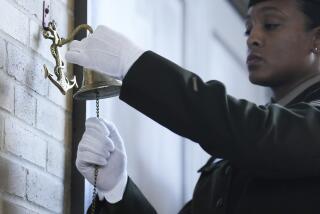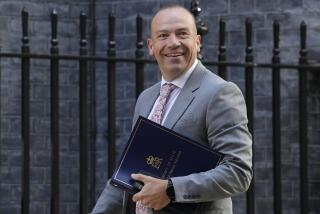Britain Frees 6 Wrongly Held for 16 Years : Justice: The Irishmen were falsely convicted and jailed for a 1974 IRA bombing that killed 21. The case shakes faith in the British police and courts.
- Share via
LONDON — Six Irishmen wrongly convicted and jailed 16 years ago in the Irish Republican Army’s deadliest attacks in Britain won their freedom in a court hearing Thursday, ending a case that shook faith in Britain’s justice system and police.
The appeal by the “Birmingham Six” followed the quashing of other convictions in connection with bomb attacks in Britain by the Irish Republican Army.
Three judges reversed the murder convictions against the six Irishmen, imposed for the bombing of two pubs in the city of Birmingham in 1974, killing 21 people.
The IRA, fighting British rule in Northern Ireland, later claimed responsibility for the bombing.
The six are Patrick Hill, 45, Hugh Callaghan, 60, Gerard Hunter, 42, Richard McIlkenny, 57, William Power, 44, and John Walker, 55.
Sitting with two other appeal judges, Lord Justice Lloyd told them: “In the light of fresh evidence which has become available since the last hearing in this court, your appeal will be allowed and you will be free to go. . . . “
The announcement was greeted with cheers and applause from their supporters in the court, and the cheering spread to a crowd in the street outside London’s Old Bailey court.
The men emerged from the court to tearful reunions with their families and cheers from a crowd waving Ireland’s flag.
“For 16 1/2 years we have been . . . scapegoats. The police told us from the start that they knew we hadn’t done it,” Patrick Hill shouted. “They told us that we were selected and that they were going to frame us.”
The men embraced tearful wives and daughters and posed for a picture with Chris Mullin, a Labor Party member of Parliament whose book, “Error of Judgment,” had brought attention to the case.
Four of the six--Power, Callaghan, McIlkenny and Walker--had confessed, but maintained they did so only after being beaten.
The prosecution case was based on those confessions and scientific tests that purportedly showed Power and Hill had handled nitroglycerin.
In 1975, after the six had been sentenced to life in prison, 14 prison officers were charged with assaulting them. The officers were acquitted in a jury trial.
The men were convicted largely on scientific evidence now considered unreliable and some police testimony described as “less than honest” by defense lawyers.
A senior government forensic scientist was forced to retire after many of his findings, including those relating to the six, were shown to be false, and an appeal court judge said police investigating the case had lied.
Minutes after the six Irishmen were released, Home Secretary Kenneth Baker stood grim-faced before Parliament to say that a Royal Commission will review every aspect of the British judicial process from police interrogation to appeal.
The case soured relations between Britain and Ireland. Members of the Irish Parliament had campaigned for the men’s release, and the issue has been aired in Congress and the European Parliament.
Irish Prime Minister Charles Haughey welcomed the “release and final vindication of the innocent Birmingham Six.”
The Economist magazine called their case one of the greatest miscarriages of British justice this century.
Legal experts say the cases of the “Birmingham Six” and the “Guildford Four”--three Irishmen and a British woman freed in 1989 after spending 14 years in jail wrongly convicted of similar bombings--exposed police corruption and reluctance among judges to believe it could have occurred.
“Judges in the court of appeal have shown an amazing reluctance to overturn convictions . . . based on an inability to believe that this level of corruption and malpractice could exist among the police,” said John Wadham of the National Council for Civil Liberties.
He said the cases of the Birmingham Six, Guildford Four and others “raise a substantial question mark about the integrity of our police force,” and “we do not believe that the protections now available will prevent similar cases in the future.”
In the Guildford Four case, legal authorities found that police had fabricated evidence and lied to obtain convictions.
The release of the Birmingham Six will also undermine arguments of the pro-hanging lobby, which wants the death penalty restored.
Had it been in force in the 1970s, there might have been no Birmingham Six or Guildford Four appeals. All 10 might have been executed.
More to Read
Sign up for Essential California
The most important California stories and recommendations in your inbox every morning.
You may occasionally receive promotional content from the Los Angeles Times.













